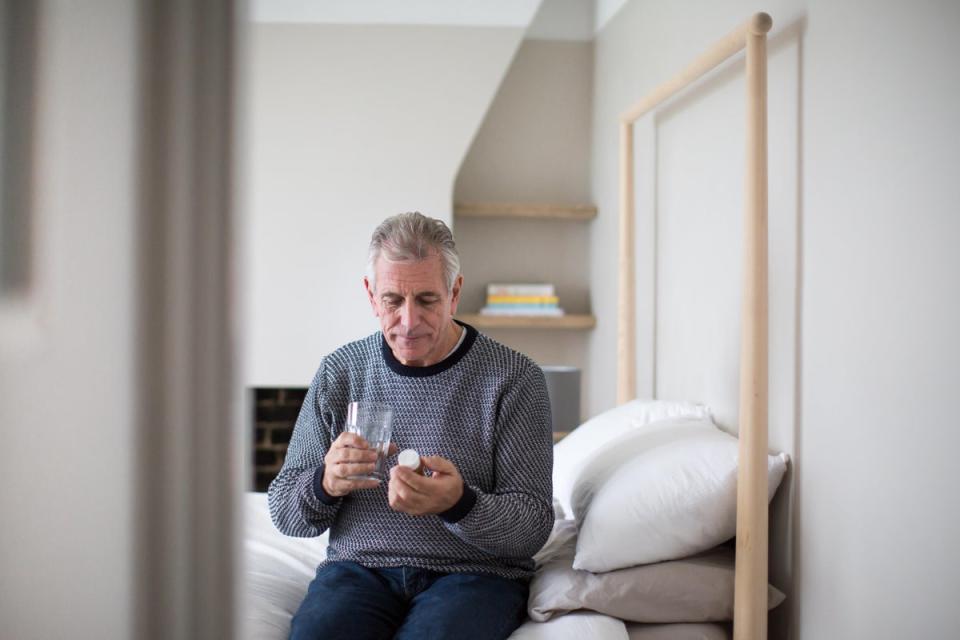As Millie Mackintosh opens up on Instagram, what is anxiety medication and when is it prescribed?

- Oops!Something went wrong.Please try again later.
Millie Mackintosh has revealed she began taking medication after becoming “more anxious than ever” during lockdown.
In a heartfelt Instagram post, the mum-of-two, 33, said her anxiety had worsened since becoming a parent.
“I have had anxiety most of my life and found helpful tools manage it. However, since lockdown & becoming a mother my anxiety (particularly social anxiety) really started to take over, consuming my thoughts leading me to feeling trapped,” the former Made In Chelsea star and influencer wrote.
“I engaged with therapy, to try and understand where the anxiety stems from, which meant visiting some painful experiences from my teenage years in hope it would release some of the association and anxiety. Instead I found it really triggering & became more anxious than ever,” she continued.
After talking it through with her therapist, Mackintosh said she decided to start taking a “low dose” of medication while continuing with talk therapy alongside.
“Although I knew this was the best decision, I found it difficult to admit to myself and to my family that I needed this kind of help,” Mackintosh also wrote. “I would always encourage and support friends and family in their own mental health journey, but I guess it’s different when you are the one in need.”
Anxiety is among the most common mental health problems people experience. It can come in various forms and affect people in different ways – so what exactly is anxiety medication and when is it prescribed?
What is anxiety medication?

Medication isn’t always used for treating and managing anxiety, but it is one of the options that may sometimes be suitable.
“Anxiety medications are prescribed to people suffering from generalised anxiety disorders. The type of medication will vary from person to person, and depend on both psychological and physical symptoms,” says Dr Akash Patel, GP and medical director at MyHealthcare Clinic in London (myhealthcareclinic.com).
“Some of the most common include selective serotonin reuptake inhibitors (SSRIs), which increase levels of serotonin in the brain, and serotonin and noradrenaline reuptake inhibitors (SNRIs).”
When is anxiety medication prescribed?
Whether to take medication for anxiety can be a very individual thing, taking various factors into account.
“Anxiety medications are prescribed if a generalised anxiety disorder is having an impact on someone’s day-to-day life. Whether or not you want to take them is a very personal decision,” says Patel. “Speak to your GP, who can talk you through the pros and cons.”
What about side-effects?
With any form of medication, it’s important to talk through potential side-effects beforehand.
When it comes to SSRIs, according to the NHS, there may be a chance of experiencing things like agitation, sickness or nausea and reduced sex drive. As far as SNRIs like venlafaxine go, you may experience similar side-effects, as well as potentially drowsiness, dizziness, headaches and dry mouth.
Side-effects can vary from person to person and it’s important to talk through any concerns. If you do experience side-effects, you can keep an eye on how they’re impacting you and discuss this with your doctor.
Many people don’t have problems, but if side-effects are severe, they may be able to suggest adapting the dosage or trying a different type of medication – but it’s important to do this under your doctor’s guidance.
What are the alternatives?
Patel explains that medication is not a catch-all solution for anxiety. Plus, it’s often part of a wider approach to managing your mental health, and some people may feel certain routes are a better fit for them.

“Alongside or instead of medication, people are usually advised to try a range of therapies, including cognitive behavioural therapy (CBT), which involves challenging thought-patterns and behaviours and can be particularly effective for anxiety,” says Patel. “You can refer yourself directly for CBT on the NHS and also seek this treatment privately.
“You may also wish to consider other therapies, including guided self-help or group courses, as well as relaxation techniques.”
Many people also find a whole host of things helpful for managing anxiety, including exercise, mindfulness meditation and counselling or psychotherapy.

